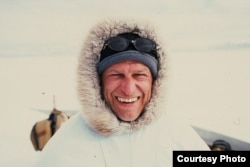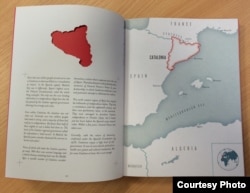What makes a country? What's to stop you from planting a flag in your own front yard and declaring your home a sovereign nation?
It seems like a ridiculous question, but it has merit. In the past 25 years, the world has recognized dozens of new countries, and mapmakers have been scrambling to keep up.
The fall of the Soviet Union in 1991 created 15 new republics. Countries, it turns out, come and go. And on today's maps, there are plenty of wannabe countries that are struggling for recognition. South Sudan, for instance, has only been a nation since 2011. Many others are lesser known, or completely unnoticed.
Lost lands in fiction and reality
British photographer and writer Nick Middleton is trying to change all that. His new book, The Atlas of Countries that Don't Exist: A Compendium of Fifty Unrecognized and Largely Unnoticed States, explores the struggle of 50 of those places to become recognized countries.
He came up with the idea of profiling wannabe countries when he read the children's classic The Lion, The Witch and The Wardrobe to his young daughter.
"The nub of the story hinges on there being a secret land at the back of the wardrobe in an old English country house," he explained. "This appealed to my daughter and it also appealed to me."
It was not in Narnia, but on the Isle of Man that Middleton discovered that countries which aren't countries actually exist.
"It's an odd place because it's not a part of the U.K. nor is it a part of the European Union," he observed, "yet they use the British pound, they have passports that look very much like ours, and yet they have a great degree of autonomy. In fact, the Isle of Man has the world's oldest continuously operating parliament, which goes back to the 8th century, if you believe it. So, it's sort of a strange limbo land. It has a high degree of autonomy and yet it's not a separate country."
The atlas includes places that make headlines — like Northern Cyprus and Catalonia — and many others that don't. Such places include Christiania, a communal self-governing society in Denmark; Forvik, a Shetland island created by an English yachtsman; and Seborga, a principality that declared independence from Italy after a referendum in 1995.
What they all lack is international recognition.
"Recognition is a critical issue most of these would-be wannabe nation states are desperate for, to the extent whereby some of them have set up their own parallel organizations to diplomatically recognize each other," he pointed out. "So there is an Unrepresented United Nations, a UUN, with several dozen members. There is an Unrepresented Nations and People Organization, UNPO, with a similar number of members."
Africa's unnoticed countries
There are 54 countries on the African continent, plus the Indian Ocean island of Mayotte, which chose to forgo independence from France with the other Comoros islands in 1975; Barotseland, a monarchy on the border between Zambia and Angola; Ogoniland, an indigenous Niger Delta kingdom; and Somaliland.
"Somalia as a country was independent in 1960," Middleton said. "It was put together because ethnic Somalis lived in what was British Somaliland, and what was Italian Somaliland. They went together as Somalia until, sadly, the country started pulling to bits in a civil war. And in 1991, the north Somaliland broke away from the South. It's been running its affairs very well ever since. It's relatively peaceful, it's stable. It has democratic elections, they have its own currency, their own police force, their own schools, yet no other country in the world would recognize it."
Lakotah Sioux's sad story
Four unrecognized countries in North America belong to indigenous people.
The Lakotah Sioux signed a treaty with the U.S. government in the 1860s, granting territory in the Black Hills to the Lakotah Sioux "in perpetuity." But when gold was found in the Black Hills, as Middleton puts it, "all bets were off," and fortune hunters poured into the territory.
In the 1970s, a U.S. court ruled that the seizure of the Black Hills was unconstitutional and the U.S. government needed to pay the tribe compensation. The total was more than half a billion dollars now, but the Sioux wouldn't take the money. They just want their land back. They're still fighting that battle.
The independence dream
The author says that of all the countries he profiled, just one is likely to achieve international recognition as a nation: the island of Greenland, an autonomous territory of the Kingdom of Denmark.
"It may happen in our lifetime," Middleton said. "A year to look out for is the year 2021, because it's the 300th anniversary of the beginning of the Danish colonial rule in Greenland."
It is said that history belongs to the victors, but maybe it belongs to the mapmakers. Middleton says his book is an attempt to acknowledge some of those unnoticed, unofficial countries still working to make their mark on the world map.








